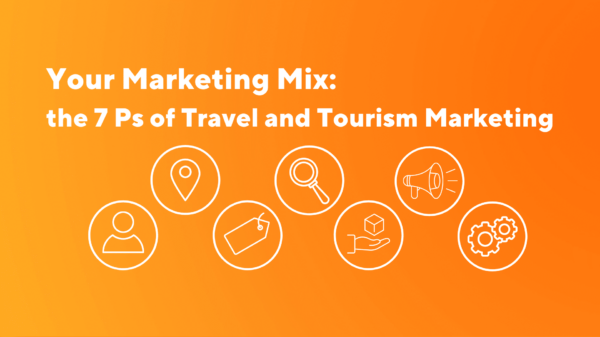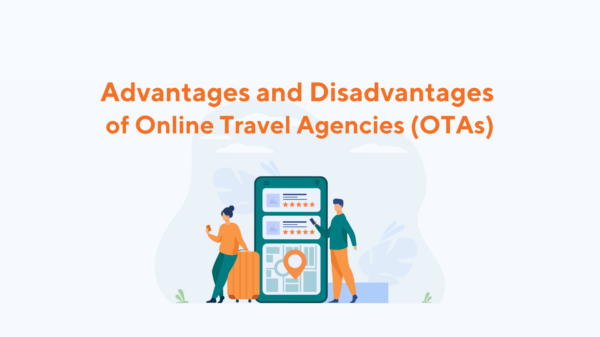If the experiences you offer aren’t the thrilling, extreme sorts of adventures, you probably don’t spend much time thinking about nervous guests. After all, what is there to be afraid of in an average city tour or stand-up paddleboard class?
For anxious or nervous travelers, the answer could be “everything.”
Nervous travelers cite worries about getting lost, partaking in unfamiliar activities, flying, navigating language barriers, dealing with ill health, and securing their personal safety. For travelers with anxiety disorders, those worries can be extremely hard to overcome, and are often anything but rational.
But anxiety and nerves aren’t keeping travelers at home. Anxiety disorders affect nearly a fifth of all Americans, and anxieties that don’t meet diagnostic criteria affect far more of us than that. Travel and adventure might be especially scary for anxious travelers, but they’re still going out and exploring the world.
In fact, travel can be an antidote for many anxiety sufferers who find relief in breaking far from their everyday routines. And they’re not just taking it slow. Even the most adventurous experiences can attract customers with anxiety – people who break out in a cold sweat at the idea of having to make a phone call may be totally comfortable jumping out of a plane.
So how do you accommodate travel anxiety and make your business more welcoming to the of millions of anxiety sufferers out there?
Prepare Your Website
Travel anxiety begins early, and so should you. People who travel with anxiety often soothe their worries with research — lots and lots of research. If you can answer their questions before you know they have them, you’re off to a good start.
Your booking website will be the first point of contact for these cautious planners.
Making your website more accessible to anxious travelers is easy, and will make your business more attractive to much as 20 percent of your potential customer base. What’s not to love about that?
Eliminate Uncertainty
Uncertainty is one of the leading triggers for anxiety, whether we’re talking about anxiety disorders or good old fashioned nerves. “Intolerance of uncertainty” is the official term, and the more of it someone has, the less comfortable they are in situations where they don’t know what to expect.
Intolerance of uncertainty is also linked to indecisiveness — so the more certainty you can offer, the more likely it is that your customers will feel comfortable pulling the trigger on their bookings.
Here are a few ways to offer your customers certainty on your booking website:
Tour description: Put your storytelling skills to work here. While more information is good for nervous travelers, so is a rich mental image of what’s to come. People with anxiety are especially good at visualizing negative outcomes, so counter that with a vision of the wonderful experience your company provides.
Pick up: This is one of the most crucial, and most easily overlooked, places to be clear. If you pick up your guests, include all the pertinent details — if not on your website, certainly in your pre-tour emails. Be clear about where the pickup will happen.
If you can, consider telling customers what to expect when they’re picked up. What kind of vehicle will pick them up? How will they know they’ve got the right driver? Do they need to hand over any information or tickets at the time of pickup? You don’t have to have all the answers, but the more clarity you can provide, the better.
Reviews: Anxious travelers research, and reviews are the single best way to learn what tours and activities are really like. Make sure your website includes reviews so customers don’t need to go searching.
With Rezgo, you can connect directly to TripAdvisor to share reviews with your potential guests.
Contact Information: Anxious or otherwise, potential customers often have questions. If you don’t answer questions online, you may lose out on customers who aren’t comfortable on the phone. Use your contact forms and monitor them, or have an email address listed on your website.
Once you have that, all you need to do is answer.
Prepare Your Tours and Activities
Everyone’s experience of anxiety is unique, and you won’t be able to prepare for everyone’s individual concerns. That said, there are several travel anxieties that stand out from the pack.
Crowds
For some people, being trapped in a crowd is an absolute nightmare. Help them out by avoiding the most crowded areas at the busiest times of day. If your tours or activities involve a lot of people, keep an eye out for stragglers. They might be overwhelmed by the crowd, but that doesn’t mean they should be left out of the proceedings.
Bathroom Breaks
Anxiety isn’t all in the head, literally or figuratively. Our bodies have strange methods of dealing with stress, and that can include chest pain, a racing heart, sweaty palms — and sometimes, the need for a quick trip to the loo. A simple heads up about the plans for bathroom breaks or the location of the facilities can ease those unfortunate fears.
Social Situations
Great tour guides keep their guests relaxed and make them feel welcome, and sometimes that means breaking the ice. For guests with social anxiety, though, being forced to take part in ice breakers can be tough. Gently nudging reluctant guests to participate can be a good idea. But if someone’s genuinely resistant, just let them sit the group-building activities out. Immersion therapy isn’t generally in a tour guide’s purview.
Dining
For something we all do pretty much every day, dining can be a surprisingly fraught experience — especially if you’re in a foreign environment. If your activities involve potentially confusing cultural dining experiences, don’t leave your guests to flounder their way through unfamiliar customs. Lead by example, instead.
Security
Personal safety is one of the biggest concerns among travelers, and high-profile terrorist attacks make that worry even more prevalent. Paradoxically, though, listing off all the reasons your guests should feel safe can make them feel even less secure. Instead, ensure you project confidence, answer guests’ questions about personal safety, and be straightforward if you do need to warn guests about any safety-related issues.
Scheduling
Anxiety and overloaded travel schedules go hand in hand. Fortunately, it’s an easy issue to address. All you have to do is keep your tours on schedule. Of course, that isn’t always in your control, so if delays come up, make sure to give your guests as much notice as possible so arrangements can be made. If your staff can help guests through travel delays, all the better.
Money
Unexpected expenses can be disastrous for a traveler on a budget. Help soothe those worries in advance by listing any extra costs your guests might be responsible for. With online booking software like Rezgo, you can offer add-ons and charge fees up front, so no money needs to change hands on the day of the tour or activity.
General Preparation
Anxious people don’t usually travel light, preferring to be prepared for any contingency. When travelling, luggage limits and border restrictions can force people to leave their contingency plans behind. Having gum or mints, facial tissues, and basic first aid and hygiene supplies on hand can be a lifesaver.
When it comes to anxiety or nerves, a little preparation and empathy goes a long way — and can make your guests loyal for life.






